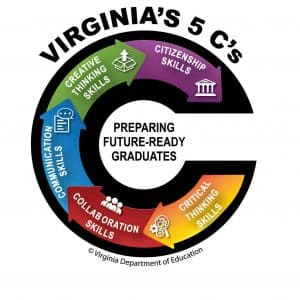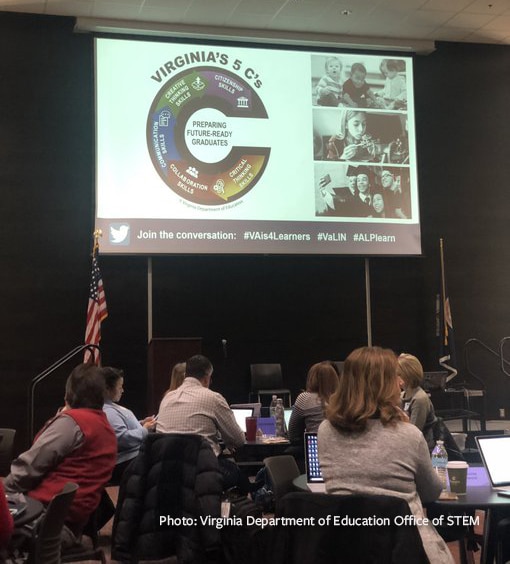Education Innovation Is Flourishing Across the Commonwealth of Virginia
Education Domain Blog
Small steps are leading to big changes across Virginia communities. In a dawn of new business opportunities across Virginia, all students need to acquire the essential knowledge and skills that lead to lifelong learning, workforce success, and active citizenship. To meet the demands of our changing economy and the needs of today’s learners, Virginia educators are sparking local innovations across communities to realize the outcomes of the Profile of a Virginia Graduate.
The Virginia Department of Education (VDOE), local school divisions, and key partner organizations are working together on big changes that will connect the future of learning in the commonwealth with the future of work in a global economy. Virginia is advancing innovative learning environments across the state through effective policy and transformative practice. The goal of this work is to ensure all Virginia learners develop the essential competencies for long-term success in homes, communities, and the workforce.
Building Regional Capacity through the Virginia Is for Learners Innovation Network (VaLIN)
The Virginia Department of Education and its partners are leading the Virginia Is for Learners Innovation Network (VaLIN), an innovative statewide professional learning initiative to advance education innovations. VaLIN acts as a conduit for solutions to challenges, leveraging resources across school divisions and connecting educational communities in Virginia and beyond.
Their mission is to develop and implement local innovations that align with the Profile of the Virginia Graduate. The profile, which was adopted by the Virginia Board of Education in November 2016, describes the knowledge, skills, attributes, and experiences identified by the board, higher education, and employers as critical for future success. The profile allows for a broader definition of student success that prepares all students for college, career, and civic life to ensure every student can succeed in K-12 education and beyond.
The profile suggests that a life-ready Virginia graduate must:
- Achieve and apply appropriate academic and technical knowledge (content knowledge);
- Demonstrate productive workplace skills, qualities, and behaviors (workplace skills);
- Build connections and value interactions with others as a responsible and responsive citizen (community engagement and civic responsibility); and
- Align knowledge, skills and personal interests with career opportunities (career exploration).
 The profile sets a new set of expectations known as the “5 C’s.” They are critical thinking, creative thinking, communication, collaboration, and citizenship skills. VaLIN identified three specific focus areas of the profile for cohort members to hone in on: deeper learning, learner engagement, and equity.
The profile sets a new set of expectations known as the “5 C’s.” They are critical thinking, creative thinking, communication, collaboration, and citizenship skills. VaLIN identified three specific focus areas of the profile for cohort members to hone in on: deeper learning, learner engagement, and equity.
VaLIN Goals
- Leverage high-quality, customized support to create and implement strategies that enhance Profile of the Virginia Graduate outcomes in their communities.
- Implement strategies designed to support students as they work to achieve the benchmarks of the Portrait of a Virginia Graduate. Over a two-year period, develop systemic innovations in structures and practices specific to local community needs (examples: internships, interdisciplinary curriculum, innovative instructional practices, performance assessment and portfolios, etc.).
- Help build the Virginia Is for Learners Innovation Network to share local innovation artifacts and strategies across connected divisions throughout Virginia through site visits, virtual gathering spaces, and professional support.
- Use the Virginia Profiles of a Leader, Classroom, and Educator to support locally determined professional learning, structural changes, and resources needed to implement Profile of a Virginia Graduate outcomes.
Fast Facts about VaLIN
- VaLIN will serve more than 600 Virginia educators over three years.
- VaLIN will include more than 65 percent of Virginia districts across varying demographics and geographies.
Partners
Virginia Is for Learners is an initiative of the Virginia Department of Education, the Virginia School Consortium for Learning (VaSCL), James Madison University, and Jobs for the Future, with support from Ted Dintersmith. Coaching is provided by Advanced Learning Partnerships and Dr. Scott McLeod from the University of Colorado at Denver. The Aurora Institute provides research and resources. The Center for Innovation in Education and Assessments for Learning Project provide guidance and technical assistance to build capacity.
Funding
The network’s activities are funded through a $125,000 federal Title II grant from VDOE to James Madison University; a $35,000 grant to VaSCL from Jobs for the Future (JFF), a national nonprofit focused on broadening educational and economic opportunity; and a $125,000 grant to VaSCL from philanthropist Ted Dintersmith.
VaLIN Cohort One: Where Small Steps Lead to Big Changes
The first three-year VaLIN cohort launched in March 2019 with 28 Virginia districts examining innovations in instructional design,  connecting learning opportunities more deeply through community partnerships, and exploring unique and powerful means to enable voice and choice. Since, VaLIN has hosted planning sessions and design thinking and leadership workshops, and the network has enabled cross-partnership networking for professional learning with coaching support. Each pilot school is currently developing resources that align with both the Profile of a Virginia Graduate and the local context of their communities through a protocol-driven process. Educators across the cohort have freely opened their doors for school visits, offered expertise and lessons learned, and generously collaborated with other educators to help one another learn, grow, and pursue common goals. On December 13, the VaLIN cohort met to share artifacts, seek feedback from peers on resources representing current state of work, and spark ideas and actions for local innovation initiatives.
connecting learning opportunities more deeply through community partnerships, and exploring unique and powerful means to enable voice and choice. Since, VaLIN has hosted planning sessions and design thinking and leadership workshops, and the network has enabled cross-partnership networking for professional learning with coaching support. Each pilot school is currently developing resources that align with both the Profile of a Virginia Graduate and the local context of their communities through a protocol-driven process. Educators across the cohort have freely opened their doors for school visits, offered expertise and lessons learned, and generously collaborated with other educators to help one another learn, grow, and pursue common goals. On December 13, the VaLIN cohort met to share artifacts, seek feedback from peers on resources representing current state of work, and spark ideas and actions for local innovation initiatives.
The 28 school divisions — grouped into 23 teams — making up the first VaLIN cohort include:
- Albemarle County
- Alleghany County
- Augusta County and Fluvanna County
- Bedford County
- Buchanan County
- Caroline County
- Cumberland County and Louisa County
- Franklin County
- Goochland County
- Greene County
- Hopewell City
- Loudoun County
- Madison County and Orange County
- Manassas Park
- Middlesex County, Poquoson and West Point
- Newport News
- Norton
- Powhatan County
- Roanoke County
- Rockingham County
- Suffolk
- Virginia Beach
- Washington County
The Assessments for Learning Project is a critical partner providing teaching and learning workshops, leadership and change management consulting, authentic learning experience design, and cross-partnership networking. During this three-year cohort, educators from the pilot schools build regional capacity and demand to scale innovations statewide.
Next Steps: Applications for the second cohort of Virginia divisions were being accepted through December 16, 2019. By January 17, 2020, the VaLIN steering committee will choose up to 35 Virginia school divisions to become the second VaLIN cohort, taking into consideration a breadth of criteria including region, size, key priorities, geography, economic data, and student demographics. New cohorts begin their work together in March each year.
With clear, comprehensive definitions of student success, such as the Profile of a Virginia Graduate, coupled with a statewide professional learning network like VaLIN, states can begin to transform their education systems and accelerate innovations, and do so in a coherent manner, so that everyone is working together to help students succeed.
Learn More:
- VaLIN Website
- Virginia Superintendent James Lane keynotes Symposium 2019
- Getting Smart Podcast: Virginia Superintendent James Lane on Unleashing Innovation
Natalie Abel Slocum is Strategic Partnerships Director at the Aurora Institute.